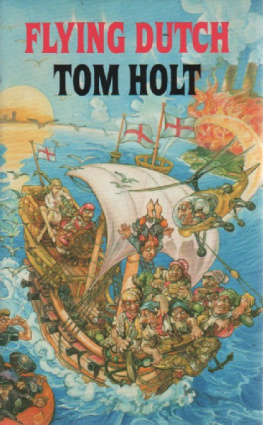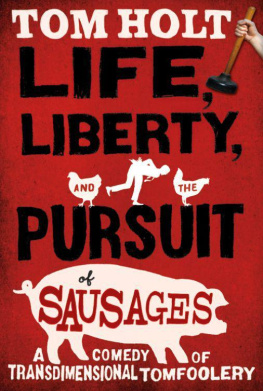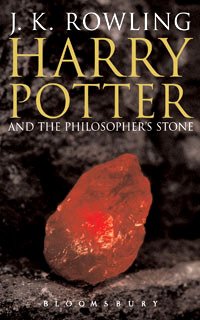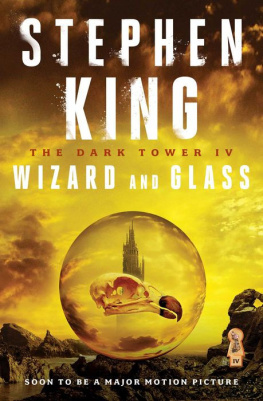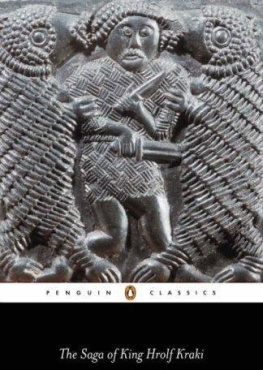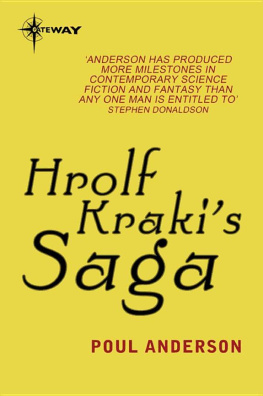Tom Holt

WHOS AFRAID OF BEOWULF?

CHAPTER ONE
Someone had written godforsaken between Welcome to and Caithness on the road sign. When he saw the emendation, the surveyor almost smiled.
Tourists, I expect, said the archaeologist disapprovingly. She had decided that the Highlands were authentic and good; therefore, any malice towards them must have proceeded from uncomprehending outsiders.
I hope not, yawned the surveyor, lighting a cigarette and changing gear. I was taking it as evidence that theres one native of these parts who can read and write. He paused, waiting for a laugh or an I know what you mean. Neither was forthcoming. Though theres no reason why any of them should. After all, you dont need to be able to read if you make your living robbing and killing passing travellers, which has always been the staple industry around here.
The archaeologist looked away. He was off again. An irritating man, she felt.
Which explains the ingrained poverty of the region, the surveyor went on remorselessly, because only a few bloody fools ever used to come travelling up here. Until recently, of course. Recently, youve had your coach loads of tourists. Theme holidays for heavy sleepers. Anyway, these days the locals dont even bother killing the travellers; they just sell them tartan key-fobs. And they all take the FT, to keep track of currency fluctuations.
The archaeologist had had enough of her companions diatribe, which had started before the car had got clear of Lairg. Rather ostentatiously she fanned away the cigarette smoke and expressed the opinion that it was all lovely. I think its got a sort of
The surveyor made a peculiar noise. Listen, he said, I was born and bred in bonnie bloody Caithness, and the only thing its produced in a thousand years is starving people. Hed read that in a Scottish Nationalist manifesto, but it sounded clever. Five years ago, the inhabitants of Rolfsness pleaded with the Water Authority to turn the wretched place into a reservoir so that they could be compensated and move to Glasgow. But its too remote even for that. The Army wont have it for a firing range, and the CEGB got lost trying to find it.
He was getting nicely into his stride now, despite the lukewarm response. The archaeologist managed to interrupt him just in time.
That reminds me, she said, tearing her eyes away from a breathtakingly lovely prospect of cloud-topped mountains, I wanted to ask you, since you were born here. Are there any old traditions or folk-tales about Rolfsness?
Folk-tales. The surveyor frowned, as if deep in thought. Well, theres an old superstition among the shepherds and crofters but you know what theyre like.
Go on. The archaeologist felt a tremor of excitement.
Well, they say that every year on the anniversary of the battle of Culloden you know about the battle of Culloden?
Yes, yes, of course.
They say that every year, at about noon, the bus from Wick to Melvich stops here for three minutes where the old gibbet used to be. But nobodys ever claimed to have seen it for themselves.
Dead silence. The surveyor shook his head sadly. Americans, he reflected, have no sense of humour.
Otherwise, apart from Bonnie Prince Charlie hiding from Butcher Cumberlands men in what is now the bus shelter, where Montrose had been betrayed to the Covenanters, no. Totally unremarkable place. Now, if there was a story that Montrose wasnt betrayed to the Covenanters here, that would be a bit out of the ordinary.
I see. The archaeologist sniffed. She should have known better than to ask. So nothing about giants or fairies or the Wee Folk?
Round here, said the surveyor grimly, the Wee Folk means Japanese businessmen looking for sites for computer factories. Not that they ever build any, of course. Have you ever tasted Japanese whisky? All the hotels up here sell it now. Personally, I prefer it to the local stuff.
The archaeologist gave up in despair, and they drove on in silence for a while. Then, as they turned a sharp corner on the side of a towering hill, the archaeologist suddenly asked the surveyor to stop the car.
What is it? said the surveyor, glancing anxiously in his rear-view mirror, but the archaeologist said nothing. She had no words to spare for such an insensitive person at the moment when she caught her first glimpse of the sea that washes the flat top of the British mainland, and, grey and soft-edged as any dream-kingdom should be, the faint outline of Orkney. On an impulse, she opened the car door and scrambled up to the top of a rocky outcrop.
Here, then, was the earldom of her mind, her true habitation. She felt as Orestes must have done when, coming secretly out of exile, he looked for the first time upon Argos, the land he had been born to rule. That was the sea of her Cambridge dreams, those were the islands she had first pictured for herself sitting on the front porch in Setauket, Long Island, with her treasured copy of the Orkney-mens Saga open on her knee. As a promised land it had been to her as she trod the weary road of professional scholarship, laying down her harp beside the waters of Cam, marching more than seven times round the book-shops of St Andrews. As she gazed out over the sea, called whale-road and world-serpent, she could almost see the blue sails of the Orkney Vikings, the dragon-prows of Ragnar Lothbrok and Erik Bloodaxe, sweeping across their great grey highway to give battle to Bothvar Bjarki or Arvarodd in the vik at Tongue.
On a clear day, said the surveyor behind her, you can just make Out the Old Man of Hoy from here. Why you should want to is beyond me entirely.
I think its wonderful, said the archaeologist softly.
I think its perishing cold. Can we get on now?
They got back into the van.
Tell me again what it is youve found, said the archaeologist briskly.
Well, said the surveyor, leaning back with one hand on the bottom of the steering-wheel, we were taking readings, and Id just sent the Land-Rover up ahead when it fell clean through this small mound. Right up to its axles, useless bloody thing, we had to use the Transit to pull it out again. Anyway, we got it out and when we looked down the hole it had made we saw this chamber underground, all shored up with pit props. I thought it was an Anderson shelter or something left over from the war, but the lads all said no, ten to one it was a Viking ship-burial.
They said that?
They all work for the Tourist Board over the summer. So we put a tarpaulin over it and sent for your mob.
Didnt you want to look for yourselves?
The surveyor laughed. You must be kidding. Roof might collapse or something. Besides, you arent supposed to touch anything, are you, until the experts arrive. Or is that murders?
The archaeologist smiled. You did right, she said.
The lads get paid by the hour, said the surveyor, and Im on bonus for being in this wilderness. Besides, if it does turn out to be an ancient monument, the project will be cancelled, and we can all go home with money in lieu. Look, there it is.
He pulled over on to the verge, and they picked their way over the uneven ground to the site. The archaeologist found that she was faced with a long leaf-shaped mound about fifty to sixty yards long, pointing due north. Under her woolly hat her hairs were beginning to rise, and she broke into a trot, her moon-boots squelching in the saturated peat. The sheer size of it made her heart beat faster. If there really was a ship down there, and if anything at all was left of it, this was going to make the
Next page

